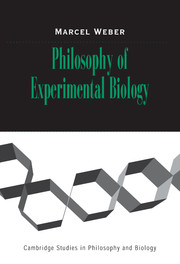Crossref Citations
This Book has been
cited by the following publications. This list is generated based on data provided by Crossref.
Griffiths, Paul E.
and
Stotz, Karola
2006.
Genes in the Postgenomic Era.
Theoretical Medicine and Bioethics,
Vol. 27,
Issue. 6,
p.
499.
Griffiths, Paul E.
2006.
Function, Homology, and Character Individuation.
Philosophy of Science,
Vol. 73,
Issue. 1,
p.
1.
Knight, Rob
2007.
Reports of the death of the gene are greatly exaggerated.
Biology & Philosophy,
Vol. 22,
Issue. 2,
p.
293.
Šustar, Predrag
2007.
Neo-functional Analysis: Phylogenetical Restrictions on Causal Role Functions.
Philosophy of Science,
Vol. 74,
Issue. 5,
p.
601.
Sirtes, Daniel
2007.
Sahotra Sarkar, Molecular models of life: philosophical papers on molecular biology.
Acta Biotheoretica,
Vol. 55,
Issue. 1,
p.
91.
Schaffner, Kenneth F.
2008.
Theories, Models, and Equations in Biology: The Heuristic Search for Emergent Simplifications in Neurobiology.
Philosophy of Science,
Vol. 75,
Issue. 5,
p.
1008.
Reydon, Thomas A. C.
2009.
Gene Names as Proper Names of Individuals: An Assessment.
The British Journal for the Philosophy of Science,
Vol. 60,
Issue. 2,
p.
409.
Stegmann, Ulrich E.
2009.
DNA, Inference, and Information.
The British Journal for the Philosophy of Science,
Vol. 60,
Issue. 1,
p.
1.
Weber, Marcel
2009.
The Crux of Crucial Experiments: Duhem's Problems and Inference to the Best Explanation.
The British Journal for the Philosophy of Science,
Vol. 60,
Issue. 1,
p.
19.
Tabery, James
and
Griffiths, Paul E.
2010.
Handbook of Developmental Science, Behavior, and Genetics.
p.
39.
Braillard, Pierre-Alain
Guay, Alexandre
Imbert, Cyrille
and
Pradeu, Thomas
2011.
Une objectivité kaléidoscopique : construire l'image scientifique du monde.
Philosophie,
Vol. n° 110,
Issue. 3,
p.
46.
Hüttemann, Andreas
and
Love, Alan C.
2011.
Aspects of Reductive Explanation in Biological Science: Intrinsicality, Fundamentality, and Temporality.
The British Journal for the Philosophy of Science,
Vol. 62,
Issue. 3,
p.
519.
Meyer, Lia Midori Nascimento
Bomfim, Gilberto Cafezeiro
and
El-Hani, Charbel Niño
2013.
How to Understand the Gene in the Twenty-First Century?.
Science & Education,
Vol. 22,
Issue. 2,
p.
345.
AMITANI, Yuichi
2013.
The Communication Puzzle of the Species Problem.
Annals of the Japan Association for Philosophy of Science,
Vol. 21,
Issue. 0,
p.
1.
Burian, Richard M.
2013.
Encyclopedia of Systems Biology.
p.
720.
Levy, Arnon
2014.
What was Hodgkin and Huxley’s Achievement?.
The British Journal for the Philosophy of Science,
Vol. 65,
Issue. 3,
p.
469.
Parke, Emily C.
2014.
Experiments, Simulations, and Epistemic Privilege.
Philosophy of Science,
Vol. 81,
Issue. 4,
p.
516.
Levy, Arnon
and
Currie, Adrian
2015.
Model Organisms are Not (Theoretical) Models.
The British Journal for the Philosophy of Science,
Vol. 66,
Issue. 2,
p.
327.
Baetu, Tudor M.
2016.
The ‘Big Picture’: The Problem of Extrapolation in Basic Research.
The British Journal for the Philosophy of Science,
Vol. 67,
Issue. 4,
p.
941.
Łatuszyńska, Małgorzata
2016.
Selected Issues in Experimental Economics.
p.
151.





